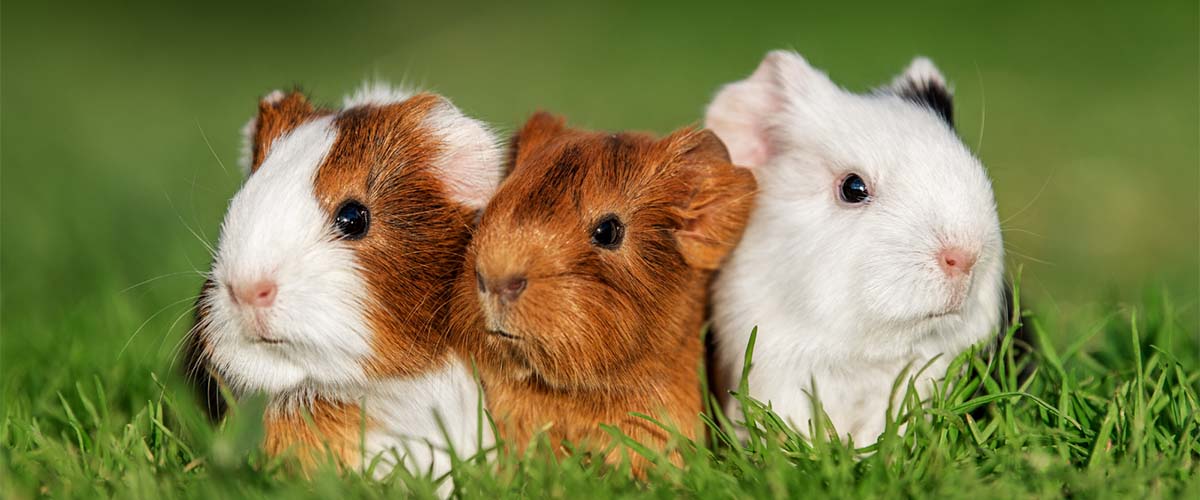Your guinea pigs’ diet
Overview
- Guinea pigs are herbivores meaning they only eat plants. In the wild, guinea pigs continuously graze (day and night) on coarse vegetation such as rough grass, leaves and herbs.
- Guinea pigs need a very high fibre diet to keep their guts moving and their continuously growing teeth a healthy length.
- Guinea pigs need vitamin C from their diet because they can’t produce it themselves.
- The best diet for pet guinea pigs is unlimited hay &, grass, plus a small daily amount of guinea pig pellets and fresh food. You may also want to give your guinea pigs daily vitamin C supplements.
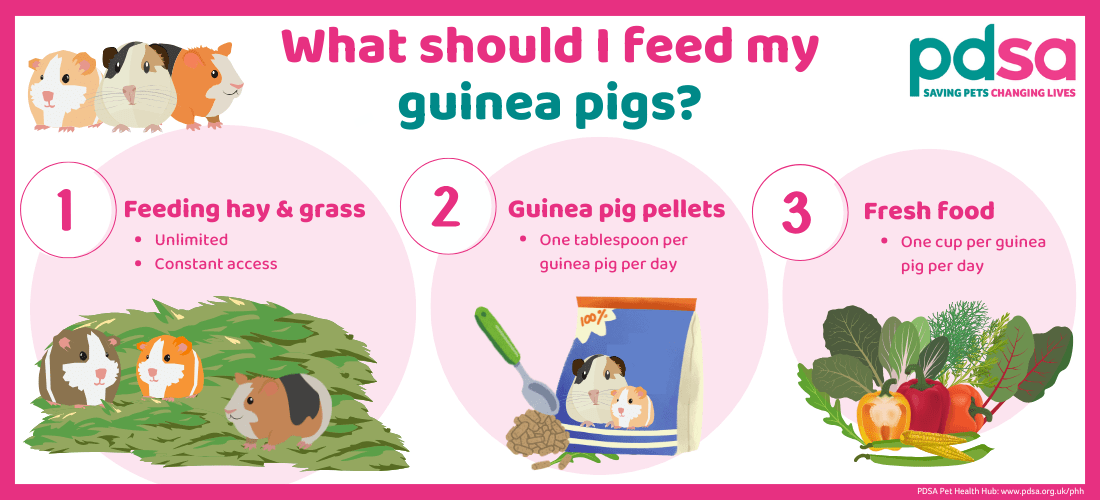
Guinea pigs need an extremely high fibre diet to keep their guts moving and their teeth a healthy length. They also need food that contains vitamin C because they can’t produce their own, which puts them at risk of developing an illness called scurvy. Here's a breakdown of an ideal guinea pig diet:
- Hay and grass: guinea pigs need a constant supply of hay and grass to provide them with enough fibre. Guinea pigs need a diet for two reasons:
-
- Their teeth grow constantly so need to be continuously worn down by chewing on fibrous foods.
- It keeps their guts moving, as lacking fibre can lead to a life-threatening condition called ‘gut stasis,’ where the digestive system slows down or stops working.
- Guinea pig pellets: one tablespoon per guinea pig per day, these also should contain vitamin C.
- Fresh veg and greens: one cup per guinea pig per day. Choose a variety of vegetables, including some high in vitamin C.
- Fresh drinking water: constant access to fresh water.
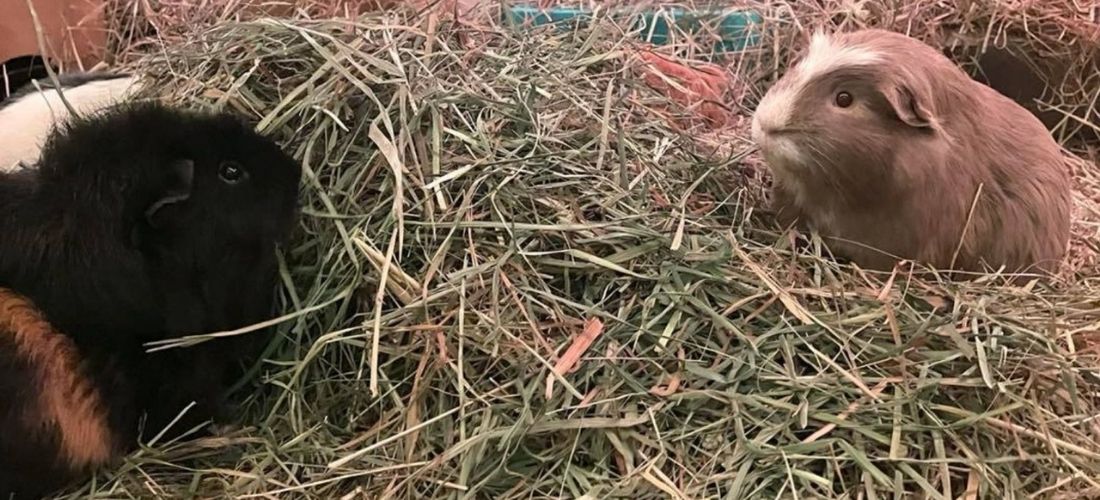
Make sure your guinea pigs always have plenty of fresh feeding hay and grass available. It should make up 85-90% of their diet; unlike pellets, you can’t overfeed it. Timothy hay is a great option, and fresh grass can either be eaten straight from the lawn or you can pick it for them if they don’t have access to the outdoors.
Avoid mown grass clippings because it tends to ferment quickly which can make guinea pigs very unwell. The best way to encourage natural foraging behaviour is to scatter large piles of hay and grass throughout your guinea pigs’ living space.
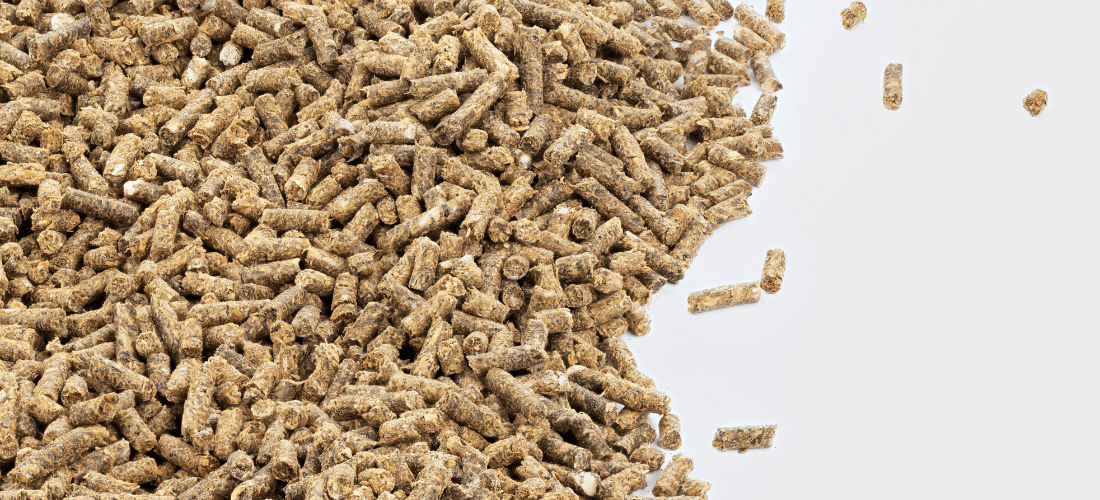
Our vets recommend giving one tablespoon of pellets per adult guinea pig each day to provide them with essential nutrients such as vitamin C. Make sure the pellets you choose are grass-based and specifically made for guinea pigs. They need to be a consistent shape and colour, so your guinea pigs don’t only eat the bits they like best (never feed a muesli-style mix).
Scatter the pellets throughout your guinea pigs’ cage instead of putting them in a bowl to encourage them to forage and stay active. Store the pellets in a dry, cool and dark place and use them within three months of purchase. This is because the vitamin C inside the pellets will slowly break down over time, and much more quickly if they are exposed to heat or sunlight.
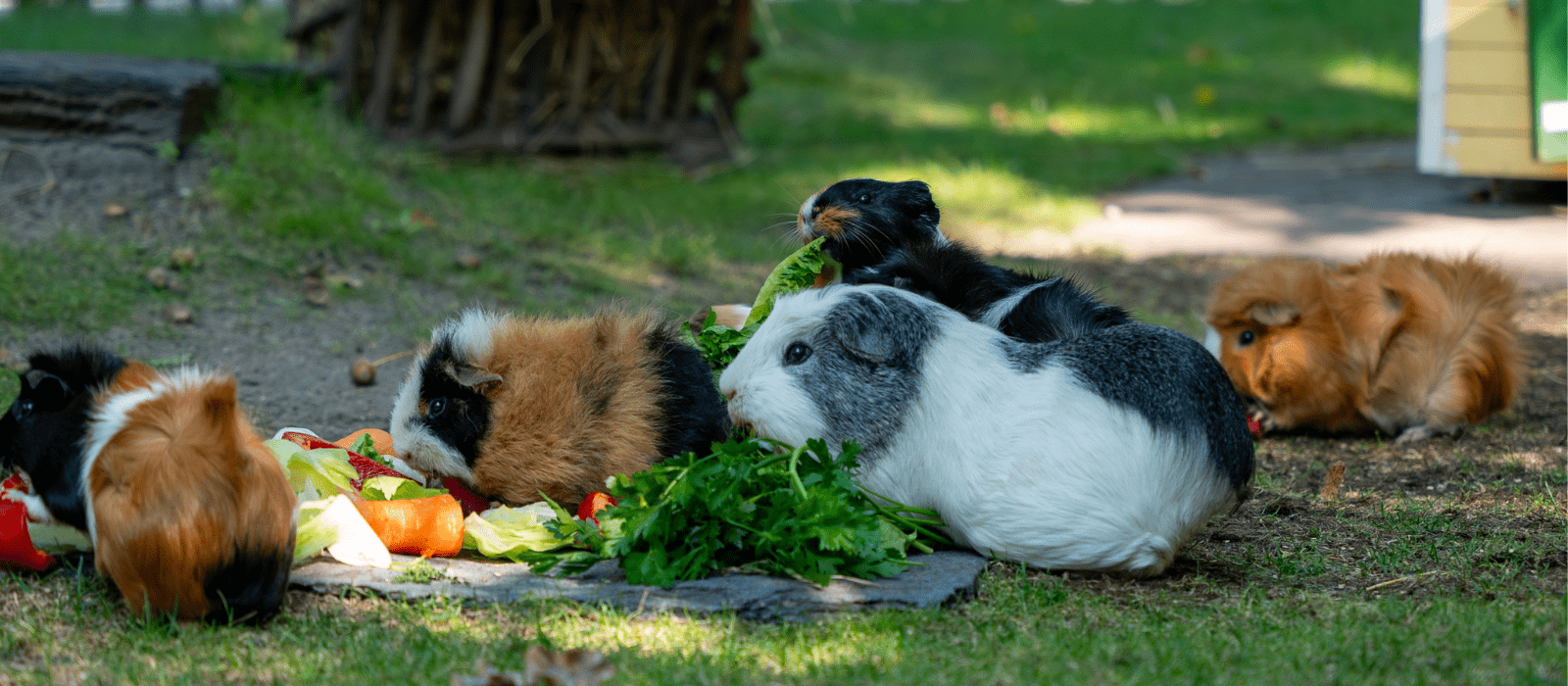
Our vets recommend feeding each of your guinea pigs one cup of fresh vegetables, greens and foraged foods daily to provide them with essential nutrients such as vitamin C. Give them a variety of at least five to six different types each day, and be sure to include some that are high in vitamin C.
Avoid giving them too much of any one type because some, like cabbage or broccoli, can cause gas if fed in large quantities. If you forage foods for your guinea pigs, make sure you can identify them, and avoid collecting them from areas where weed killers or pesticides are used, as well as high-traffic areas that are busy with people and dogs. As with the rest of their food, scatter your guinea pig’s fresh food throughout their cage to encourage them to hunt for it like they would in the wild.
If you are introducing a food for the first time, do it slowly to prevent any tummy upsets. We have compiled a list of safe vegetables, greens and herbs in the image below.
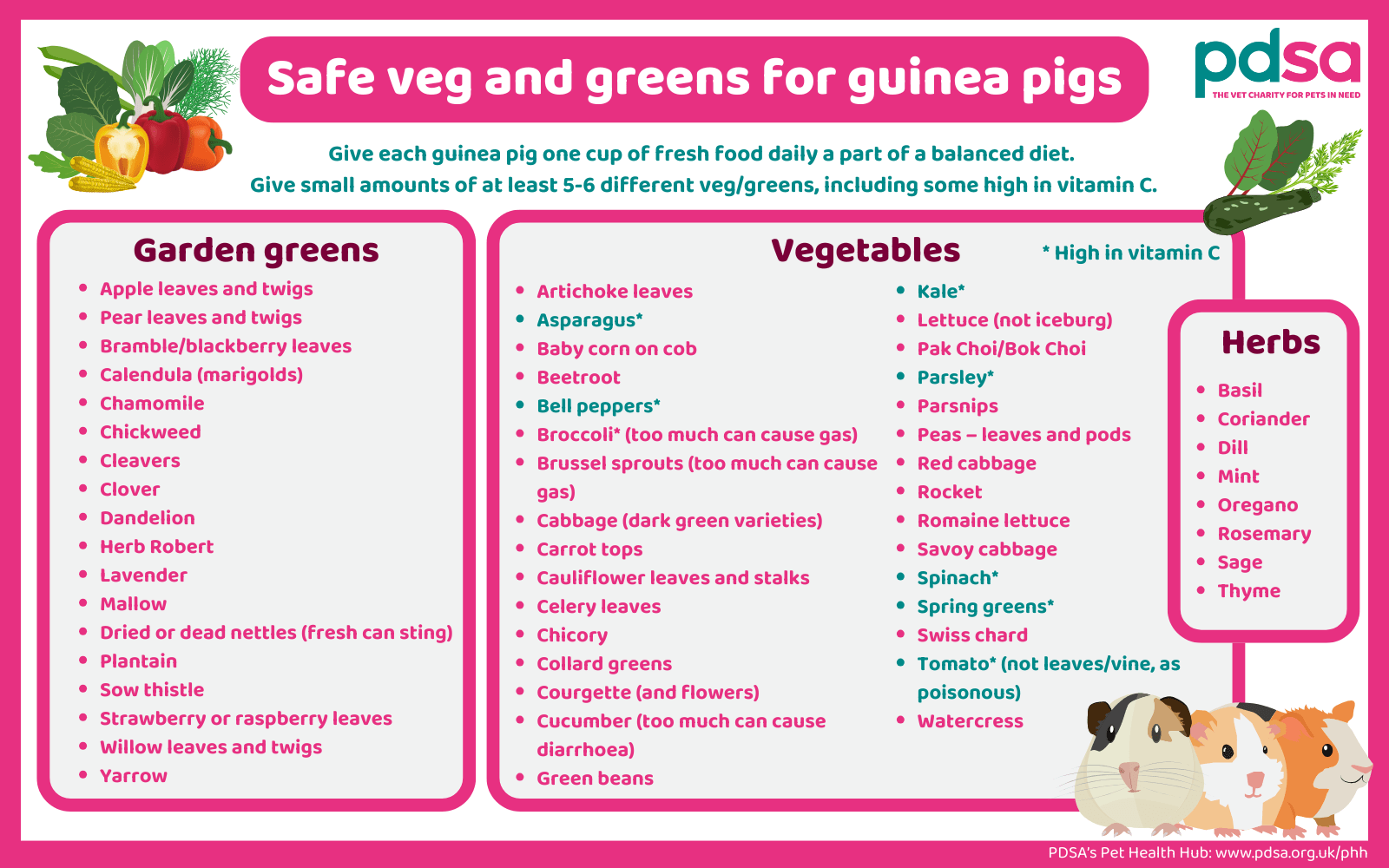
Can I give my guinea pigs a treat?
It’s fine to give your guinea pigs a treat once every week or two, but try to avoid anything too sugary, such as the colourful guinea pig treats available in pet stores. These types of treats tend to be very high in sugar and bad for your guinea pigs’ teeth and tummy. Instead, our vets recommend:
- Fresh vegetables
- Items foraged from the garden
- Fresh fruit, but in very small amounts because fruit is high in sugar. Guinea pig-safe fruits include:
- Apple (not the pips because they’re poisonous)
- Banana
- Blueberry
- Carrot
- Cherry
- Kiwi
- Melon
- Pear
- Plum
- Squash
- Strawberry
If you give your guinea pig a treat, reduce their food accordingly that day so they don’t have too many calories.
Do guinea pigs need vitamin C supplements?
If you’re feeding your guinea pigs a balanced diet and daily fresh greens high in vitamin C, you shouldn’t need to provide them with any additional supplements. However, it can be difficult to know if they are getting enough, so if you are concerned, we recommend giving them a daily vitamin C supplement in/on their food. Vitamin C supplements in water aren’t recommended as vitamin C is weakened by sunlight and the taste of the drops can put some guinea pigs off drinking.
- Is it possible to overdose a guinea pig on vitamin C?
- Is it normal for my guinea pigs to eat their own poo?
- Which vegetables are unsafe for guinea pigs?
- How do I change my guinea pigs’ food?
- Can too much calcium in vegetables cause a problem for guinea pigs?
- Why are my guinea pigs always eating?
Is it possible to overdose a guinea pig on vitamin C?
If you feed your guinea pig a balanced diet and follow the guidelines on their vitamin C supplement packaging, it’s very unlikely that you will overdose them on vitamin C.
Is it normal for my guinea pigs to eat their own poo?
Yes, it’s completely normal for your guinea pigs to eat their poo. In fact, it’s an essential part of their digestion that allows them to get all the right nutrients from their food. Guinea pigs produce two types of poo:
- Soft, sticky poos called ‘caecotrophs’: This is the poo that your guinea pigs eat. They tend to eat them straight from their bottom so you won’t see caecotrophs very often.
- A hard dry pellet: This is the result of your guinea pig eating the caecotroph and pooping it out again as a solid pellet. Your guinea pigs won’t eat their solid pellets.
Which vegetables are unsafe for guinea pigs?
Not all fruits and vegetables are safe for your guinea pigs to eat – some are poisonous, some cause an upset tummy, and some are a choking hazard. These include:
- Potatoes & their skin
- Onion
- Garlic
- Mushrooms
- Tomato vine and leaves (the fruit is safe to feed)
- Avocado
- Iceberg lettuce
- Rhubarb and leaves
- Chives
If you suspect your guinea pigs have eaten something poisonous, speak to your vet for advice.
How do I change my guinea pigs’ food?
If want to make a change to your guinea pigs’ diet, it’s important to do so slowly over two to four weeks. Changing it too quickly might cause a tummy upset and stop them from eating, which is very serious in guinea pigs.
Start by mixing a small amount of new food with their current food – each day gradually increase the amount, alongside reducing their old food, until they have fully transitioned. Monitor for signs of a tummy upset, and slow the process down if you notice any problems. New fresh foods should also be introduced in this way to prevent tummy upsets.
Can too much calcium in vegetables cause a problem for guinea pigs?
For most healthy guinea pigs, feeding a balanced diet with the right amount of vegetables and leaves will mean they get the right amount of calcium. If any of your guinea pigs have a medical condition that is affected by calcium, such as a urinary or bladder problem, speak to your vet for advice.
Why are my guinea pigs always eating?
Guinea pigs are natural grazers, so you should expect to see them eating hay and/or grass day and night – the constant chewing keeps their teeth and gut healthy. If a guinea pig stops eating, they are at risk of developing a life-threatening health problem, called gut stasis.
The best way to check whether your guinea pigs are eating properly is by weighing them regularly. Weight loss can be a sign of illness, and weight gain could be a sign you’re overfeeding fresh food or pellets. It’s essential to contact your vet if you’re worried that your guinea pigs are eating less, or if you notice a significant change in their weight.
Published: October 2024

